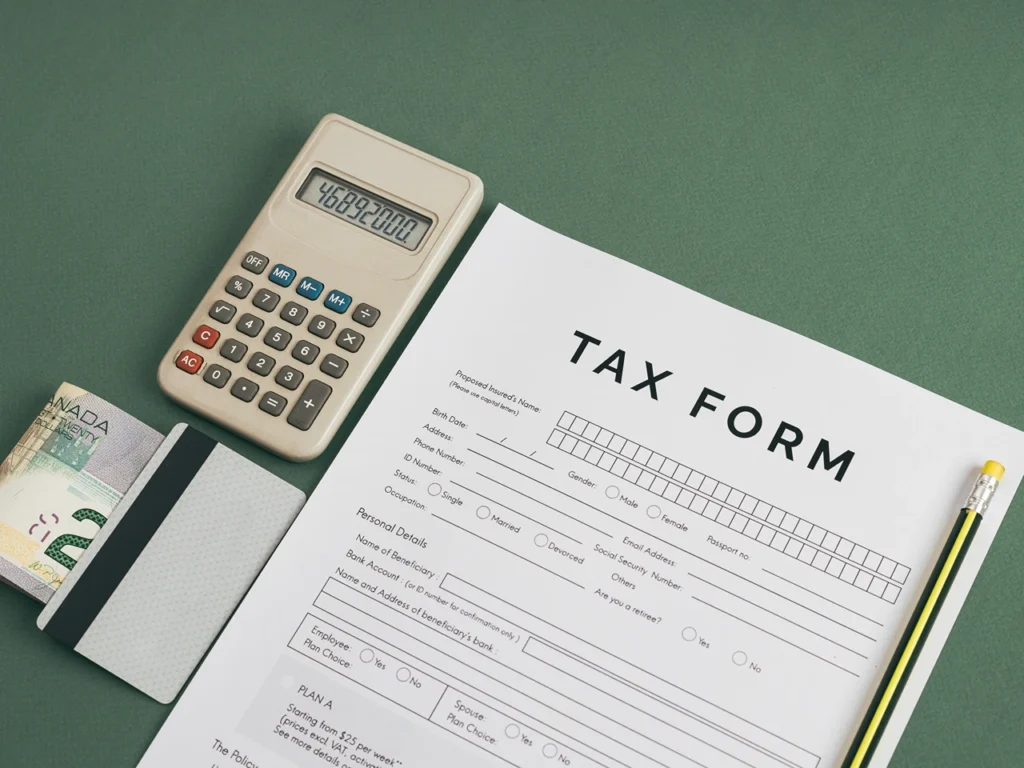Can You Claim Counselling on Taxes in Canada? Tax Deductible Medical Expense Explained
A common question many Canadians ask during tax season is whether counselling or therapy can be claimed on a tax return. In many cases, therapy can be claimed as a tax-deductible medical expense under CRA rules. Understanding how it works clears up the confusion and helps you get the most out of the tax break you’re entitled to.
In this guide, we’ll walk you through how counselling fits into the medical expense tax credit, which practitioners the CRA recognizes, and the steps to properly claim it on your tax return, so you can save money while still prioritizing your mental health.
Can You Claim Counselling on Taxes in Canada?

Counselling may be able to claim status as a tax deductible in Canada, but it depends on the circumstances. The Canada Revenue Agency (CRA) doesn’t automatically treat every type of counselling as a medical expense. Instead, it looks at whether the services were provided by authorized medical practitioners and if they fall within the list of eligible medical expenses for the medical expense tax credit (METC).
- Federal rules apply: This is separate from provincial benefit programs or insurance coverage. Only the CRA decides what can be claimed on your tax return.
- Credentials matter: Services count only if they’re from recognized medical practitioners for the purposes of the METC.
- When it doesn’t qualify: Life coaching, wellness counselling, or any service from an unlicensed provider does not count.
This means counselling services for your immediate family members may also be claimed on your income tax return, provided they are eligible.
Therapy as an Eligible Medical Expense (METC): Scope and Who Can Claim

The medical expense tax credit is a non-refundable tax credit that allows you to claim a wide variety of medical expenses, and therapy can fit under this umbrella if provided by an approved medical practitioner. This credit reduces the federal income tax you owe but does not result in a direct payout.
Who may claim eligible medical expenses?
You’re allowed to claim your medical expenses for:
- Yourself
- Your spouse or common-law partner
- Dependent children under 18 years of age
- In some cases, other dependents (using line 33199 of your tax return)
Important considerations
- Provincial differences: The definition of medical practitioners for the purposes of the METC can vary. A social worker providing therapy might qualify in one province but not in another. Always check the CRA’s official list of eligible medical expenses and confirm if your provider is recognized in your province.
- 12-month claim window: Expenses must fall within a 12-month period ending in the tax year you’re filing for.
- Treatment vs. wellness: Therapy that supports treatment (e.g., disability, mental illness, or rehabilitation) has a stronger standing than general wellness or personal growth sessions. This distinction determines whether medical expenses qualify.
Which Counselling Services Are Tax Deductible: Medical Expenses You Can Claim

Not all counselling services are equal when it comes to claiming medical expenses on taxes. Only eligible counselling services offered by authorized medical practitioners are considered medical expenses that are tax deductible.
- Psychologists, psychiatrists, and psychotherapists licensed in your province usually qualify.
- In some provinces, social workers providing psychotherapy also qualify, and are recognized as medical practitioners for the purposes of the METC.
- Assessment or diagnostic sessions directed by a clinician may be included in the medical expenses you can claim.
- Services that do not qualify include life coaches, motivational counselling, or any professional not considered an approved medical practitioner.
This part’s really important: even if you paid out of pocket, you can only claim medical expenses in Canada if they’re from recognized providers.
Claim the Cost with Documentation & Receipts

The CRA requires clear proof to support the expenses you paid. If you want to claim the medical expenses, your receipts must contain specific information:
- Provider details: full name, professional designation, and license or registration number.
- Service details: the date(s) of therapy sessions and the exact medical costs you paid.
- Payment proof: the method of payment and confirmation of the total expenses.
- Organization: keep both originals and digital copies, sorted by provider and date.
Invoices should be itemized so that the portion of your medical expenses for therapy is clear. This avoids confusion in case the CRA requests additional verification.
If the CRA reviews your return, you’ll need a clear record of your expenses in Canada. Keeping solid proof makes it way easier to show that your medical costs qualify for the non-refundable tax credit.
Steps to Claim Medical Expenses

Making sure you file your therapy costs correctly on your federal tax return is just as important as knowing if they qualify. Here’s what to do when you make the claim:
Step 1: Gather Receipts (12-Month Window)
Save your receipts for all therapy and related expenses you paid in any 12-month period that ends in the tax year. Sort them by provider and date so you’re ready.
Step 2: Report Medical Expenses on Your Tax Return
Enter eligible amounts on:
- Line 33099 of your tax return (for yourself, spouse, or dependent children under 18). Use 33099 to claim the total.
- Line 33199 of your tax return (for other dependents).
This ensures your expenses on line 33099 and expenses on line 33199 of your tax return are recorded correctly.
Step 3: Calculate Your Claim
You can only claim the amount that exceeds the lesser of:
- 3% of your net income, or
- The CRA’s set threshold for the current tax year.
This means you can only claim the portion of your medical expenses that exceeds the set threshold. The more your total eligible medical expenses go over that limit, the larger your non-refundable tax credit will be.
Step 4: Finalize Accurately
Before you file your taxes, make sure each receipt shows the provider’s credentials, the right totals, and that it lines up with the medical services you’re claiming. You should also double-check any carry-forward or transfer rules (like when it’s tied to the disability tax credit).
Step 5: Confirm Expenses You Can Claim Before Submitting
Use the CRA’s list of eligible medical expenses to ensure your therapy sessions are covered. This avoids rejected claims in case the CRA challenges them. Keep your proof for the entire tax season in case your expenses were not claimed properly and a correction is needed.
Final Thoughts
Whether you can claim counselling on your taxes in Canada depends on a few things: your eligibility, the paperwork you have, and the type of practitioner you see. Not every kind of counselling qualifies, but therapy from recognized medical professionals often does. This gives you access to the medical expense tax credit and helps lower the amount of income tax you owe.
Keeping good records, making sure your provider is recognized, and sticking to CRA’s guidelines are the best ways to make your claim go smoothly. At the end of the day, understanding how counselling fits into tax rules helps you get the financial relief you deserve—while still putting your mental health and well-being first.
Frequently Asked Questions
Is counselling tax deductible in Canada?
Yes, counselling may be considered tax deductible in Canada, but only when certain conditions are met.
Authorized providers: Only therapy from recognized medical practitioners counts, which confirms that medical expenses are tax deductible if they meet CRA rules.
Approved list: In case the Canada Revenue Agency reviews your return, only those on their eligible list will be accepted as valid claims.
CRA limits: You can only claim some medical expenses, not all counselling types, especially if it’s more about wellness than treatment.
Eligibility: Counselling for yourself, your spouse, or dependents is usually eligible to claim when it falls under recognized therapy.
Family coverage: This means you may also claim some medical expenses for immediate family, provided they meet the requirements.
What should I know when claiming medical expenses on taxes in Canada?
When claiming medical expenses on taxes in Canada, there are important steps and limits you need to follow.
Receipts matter: You must show expenses paid with receipts that list the provider’s credentials and exact amounts.
Documentation timeline: The CRA requires that expenses fall within a 12-month period ending at the end of the tax year.
Amount you can claim: The amount you claim is reduced by either 3% of your income or the CRA’s set threshold.
CRA verification: If reviewed, you’ll need to prove which expenses can be claimed with clear records.
Accuracy counts: Following expenses and reporting them properly on your return helps avoid rejected claims.
Which counselling services count as medical expenses you can claim?
Not every type of counselling qualifies, so it’s important to know which expenses may count.
Recognized therapy: Psychologists, psychiatrists, and psychotherapists are among the medical professionals whose services are allowed.
Provincial differences: In some provinces, social workers qualify, while in others they don’t, so confirm before filing.
Eligible services: Diagnostic or treatment sessions usually fall under expenses that can be claimed if clinically directed.
Exclusions: Life coaches, motivational speakers, or non-licensed providers do not qualify, even if you paid out of pocket.
Clarity: This ensures only the right types of expenses for therapy are considered medical.
How do I report counselling costs on my tax return?
Filing therapy costs correctly ensures your claim goes through without issues.
Gather proof: Collect receipts within your 12-month claim window before you learn how to claim them on your return.
Where to file: Report specific medical expenses on line 33099 or 33199, depending on who they are for.
Threshold rule: You only claim the portion above 3% of income or the CRA minimum, which makes it worth claiming medical expenses when totals are higher.
Extra benefits: You may also claim amounts alongside other credits, such as the disability tax credit.
Check coverage: Always confirm with CRA’s eligible list to ensure your certain medical expenses on line entries are accurate.
Is getting help from a professional worth it for counselling claims?
Yes, sometimes consulting with a tax professional is the smartest move when you’re unsure.
Personalized advice: A tax professional can also give personalized tax guidance based on your situation.
Complex cases: They help when you’re not sure which expenses qualify for the non-refundable or refundable tax credit.
Extra credits: They can confirm if you’re eligible for the medical expense supplement or other benefits.
Accuracy: They ensure the amount you claim is correct and backed by proper documentation.
Peace of mind: Consulting with a tax professional ensures your claim is filed correctly and reduces stress at tax season.


